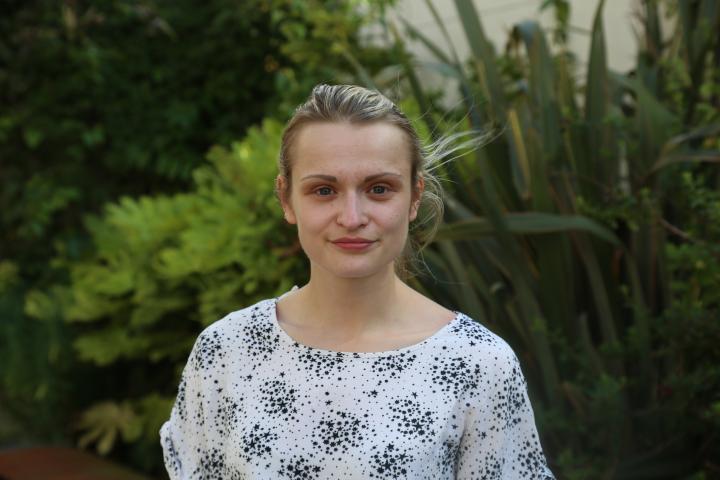
Amelia
BSc (Hons) Nursing (Mental Health)
Meet Amelia
- Started her degree aged 25 after working multiple jobs
- Came into the programme from a non-healthcare background
- Applied for Mental Health Nursing as she wanted a more rewarding job where she could help people

Why did you choose to come to University and study Mental Health Nursing?
I went to University for the first time when I was 18 and did a completely different topic. I only did a year and then I moved down south.
I worked in admin in higher education and property for about five years, but I found that I would start a job, grasp it, get bored and leave. So, I did a lot of job-hopping and I never really felt challenged.
I’ve always had an interest in Mental Health from my own experience, friends experiences and psychology. I thought ‘you know, I’d really like a more rewarding job where I can actually give back and help people’. At the time, I was working in a University in a veterinary school and I formed a really good relationship with one of the mental health nurses there. The more she told me about the kind of work she did, I thought ‘I think I’d really like that’, so I applied to come here.
I’d never worked in care and I didn’t really know what to expect, but I just thought it would be something that would challenge me and that I could actually have a long lasting career in. It’s been the most challenging thing I’ve ever done and I’ve never worked so hard in my entire life.
Can you tell us a bit about your placements?
Most of our placements have been an average of about 10 weeks long.
I’ve been at a specialised dementia care home, which was really good because it's a really specific area and a totally unique mental health condition because it’s organic. It’s more about quality of life and management than recovery.
I then went to an acute mental health setting, for when people are detained under the Mental Health Act, or come in as an informal patient when they’ve hit crisis point. Those people are really poorly because the thresholds are quite high. That was really tough, the toughest placement I’ve had, but it was also really valuable.
Then I did a placement with a specialist community team which had a fairly small caseload of people who needed intensive community support over a long period. It was completely different and it was people who were hard to engage with services such as drug users and sex workers.
After that, I put in a request which was approved to go to the eating disorders unit at Leeds. That was really good because I got to see a different trust and how they operate and it’s a really specific specialism.
In final year, I requested to go on a placement with the drug and alcohol team which I loved because it’s another specialist interest of mine. I’m now on a community mental health placement. I've actually found it a lot busier than I have been on a ward because it’s all on you.
I didn’t appreciate how academic the programme would be. I’ve loved it actually, I can’t wait to come back to education and do more study and I’d love to do a PhD one day, but I didn’t think I would’ve thought that at the beginning.
What is life as a Mental Health Nursing student like?
It’s not like a normal degree. We don’t get a really long summer holiday, we don’t get a month off at Easter and Christmas.
I think the curriculum now has three placements in years one and two, where we just had two, but it was the same amount of time (spent on placement). When I first came to University, most of the lectures were spent between all the Nursing fields so it was Adult, Mental Health and Child. There’s more of a focus on anatomy, physiology, biology and really basic Nursing in Year one.
It was quite difficult because a lot of the time it felt that we were going to sessions that didn’t feel so relevant and it felt like it was all about Adult Nursing and that was quite a challenge. In hindsight, it’s good to have that level of knowledge of the body because of the medications we work with and the type of people we work with.
In years two and three, there’s been more time within the actual field. We’re a smaller group so it’s more intimate but it’s nicer to have somebody that’s a specialist from an area that you’re interested in. We share stories and reflections and there’s a lot of wellbeing and clinical support.
Do you use any specialist facilities on your course?
There’s the Clinical Skills Suite that we use for things like moving and handling and basic life support. In Mental Health, we use them for our basic skills. A lot of what we do is about talking and listening so it’s not always needed for us as much as the other fields, but we have spent a bit of time in there.
We had a really interesting session where we had to go in (to the Clinical Skills Suite). It was a roleplay session that we did this year and we all groaned at, but actually, we really enjoyed it. We were split into groups and we were given a role. We had to act that role as if we were on a ward, running a shift in whatever role you were given. That was a really good learning experience actually.
Also in final year, they organised an advanced communication session, where they brought in some actors who would come and act out a scenario and we had to intervene and say ‘don’t do this, make sure you smile’ and all those sort of things. Then we split off into groups and we were given a scenario and the actor played that part and we had to go in and be the nurse in that role. That was really good fun actually, I loved it.

When I came to university, I registered with the disability service as soon as I got here. They’ve been brilliant. It’s the best support I’ve had from any employer or from any other area.
What are your plans for after Graduation?
I’ve looked into loads and loads of different areas. Mental Health is enormous, you don’t just have to go into acute nursing, there’s loads of specialisms.
There are eating disorders, drug and alcohol, dementia, CAMHS (Children and Adolescent Mental Health Services), forensic nursing, there’s so much.
I got really overwhelmed earlier on in the year and I was looking at all these different options and thought 'I’m really lucky, it’s really great to have loads of choice', but at the same time I found it really overwhelming.
I’m now going to go and be a prison nurse in a mental health team. That will involve some primary care work including lower level mental health conditions that you might see in your GP practice but also severe and enduring mental illness when people are acutely unwell. There’s a lot of substance misuse and there’s a lot of neurodiversity, things like ADHD and Autism.
It’s a challenging environment with lot’s of challenging behaviours. It’s a really good starting point for understanding risk, medications, behaviours and illnesses all in one place, so I’m going for prison nursing.
What one bit of advice would you give others who are considering Mental Health Nursing?
I think you’ve got to be really dedicated. You’ve got to be prepared that you will change as a person enormously. I don’t think any of us are the same as we were when we started. I’m so different now. I think you learn a lot about yourself and what you can deal with and that’s really valuable.
You become more assertive because that’s part of being a nurse. If something’s not right you have to air it, you have to make it known. It builds your resilience because you’re put in so many situations that if they were to happen to you in day to day life, they would really knock you down.
I didn’t think I’d be able to handle it but now I think ‘well if I can handle that then I can almost handle anything’. I think you have to be really dedicated because if this is not what you want to do, it’s hard work, but it's so rewarding at the same time.
The one thing I always say to friends is that I never thought I would enjoy working for free so much. I’ll go and do a full-time placement for 12 weeks and I don't even register that I’m not being paid for it. I just do it and I don’t complain about it. I wouldn’t offer to go and volunteer somewhere for 12 weeks full time, so I think you just forget that you’re not actually working.
It’s really hard but it’s really rewarding, and it will change your life.
Do you have any regrets about your decision to study Mental Health Nursing?
Oh no. Not in a million years. I wish I’d done it earlier, actually no, not necessarily, I think it was good to have a bit of life experience and a bit of grit and a dose of reality as well. It’s taught me that I can actually be quite comfortable without a salary and it really taught me that it’s not about what you earn and what’s in your bank account at the end of every month.
It’s about what you feel and what you get out of it. That was what I was looking for, a job to get me out of bed in the morning, not driven by money. So no, absolutely no regrets, I’m just so glad I got the opportunity to do it.
